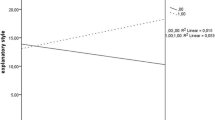Abstract
This experiment investigated the effects of three factors on performance appraisal ratings: self-appraisal information, appraisal purpose, and feedback target. Two hundred and three subjects rated a subordinate's performance on a clerical task subsequent to receiving either a high or low self-assessment. They were told they would provide performance feedback either to the experimenter (organizational agent) or their subordinate, and their ratings would be used either for an administrative decision or developmental feedback. Performance ratings were significantly higher when subjects received a favorable subordinate self-assessment than when self-assessments were unfavorable. A significant interaction was found between feedback target and the appraisal purpose. Implications for the use of self-appraisals in organizations were discussed.
Similar content being viewed by others
REFERENCES
Antonioni, D. (1994). The effects of feedback accountability on upward appraisal ratings. Personnel Psychology, 47, 351–356.
Basset, G.A. & Meyer, H.H. (1968). Performance appraisal based on self-review. Personnel Psychology, 21, 421–430.
Bernardin, H.J. Orban, J. and Carlyle, J. (1981). Performance ratings as a function of trust in appraisal and rate individual differences. Proceedings of the 41st Annual Meeting of the Academy of Management, 311–315.
Blumberg, H.H. (1972). Communication of interpersonal evaluations. Journal of Personality and Social Psychology, 23, 157–162.
Burke, R.J., Weitzel, W., & Weis, T. (1978). Characteristics of effective employee performance review and development interviews: Replication and extension. Personnel Psychology, 37, 703–710.
Campbell, D.J., & Lee, C. (1988). Self-appraisal in performance evaluation: Development versus evaluation. Academy of Management Review, 13, 302–314.
Farh, J., Werbel, J.D., & Bedeian, A. G. (1988). An empirical investigation of self-appraisal-based performance evaluation. Personnel Psychology, 41, 141–156.
Ferris, G.R., Yates, V.L., Gilbron, D.C, & Rowland, K. (1985). The influence of subordinate age on performance ratings and causal attributions. Personnel Psychology, 38, 545–557.
Fisher, C.D. (1979). Transmission of positive and negative feedback to subordinates: A laboratory investigation. Journal of Applied Psychology, 64, 533–540.
Fusilier, M.R. (1980). The effects of anonymity and outcome contingencies on rater beliefs and behavior in a performance appraisal situation. Proceedings of the 40th Annual Meeting of the Academy of Management, 273–277.
Hare, A.P. (1976). Handbook of small group research (2nd ed.). NY: Free Press.
Harris, M.M. (1994). Rater motivation in the performance appraisal context: A theoretical framework. Journal of Management, 20, 737–756.
Harris, M.H., & Schaubroeck, J. (1988). A meta-analysis of self-supervisory, self-peer, and peer-supervisor ratings. Personnel Psychology, 41, 43–62.
Ilgen, D.R., & Knowlton, W.A. (1980). Performance attributional effects on feedback from supervisors. Organizational Behavior and Human Performance, 25, 441–456.
Jones, E.E., & Wortman, C. (1973). Ingratiation: An attributional approach. Morristown, NJ: General Learning Press.
Kay, E., Meyer, H., & French, J. (1965). Effects of threat in a performance interview. Journal of Applied Psychology, 49, 311–317.
Klimoski, R. & Inks, L. (1990). Accountability forces in performance appraisal. Organizational Behavior and Human Decision Processes, 45, 194–208.
Korsgaard, M.A., Roberson, L., & Klein, D.A. (1991). The effect of self-appraisal and participation on subsequent performance. Paper presented at the Society for Industrial and Organizational Psychology Conference, 1991.
Landy, F.J., & Farr, J.L. (1983). The measurement of work performance: Methods, theory, and applications. New York: Academic Press.
Larson, J.R. (1984). The performance feedback process: A preliminary model. Organizational Behavior and Human Performance, 33, 42–76.
Latham, G. (1986). Job performance and appraisal. In C. Cooper & I. Robertson (Eds.), International Review of Industrial and Organizational Psychology. Chichester, England: Wiley.
Longenecker, C.O., Gioia, D.A., & Sims, H.P. (1987). Behind the Mask: The politics of employee appraisal. Academy of Management Executive, 1, 183–193.
Murphy, K.R., Balzer, W.K., Kellam, K.L., & Armstrong, J. (1984). Effect of purpose of rating on accuracy in observing teacher behavior and evaluating teaching performance. Journal of Educational Psychology, 76, 45–54.
Murphy, K.R., & Cleveland, J.N. (1991). Performance Appraisal: An Organizational Perspective. Boston: Allyn Bacon.
Stone, T.H. (1973). An examination of six prevalent assumptions concerning performance appraisal. Public Personnel Management, 5, 408–414.
Tesser, A., & Rosen, S. (1975). The reluctance to transmit bad news. In Berkowitz (Ed.), Advances in experimental social psychology (Vol.8). New York: Academic Press.
Tetlock, P.E. (1985). Accountability: The neglected social context of judgment and choice. In B.M Staw and L.L. Cummings (Eds.), Research in organizational behavior, Vol. 7, Greenwich, CT: JAI Press.
Tetlock, P.E., & Kim, J.I. (1987). Accountability and judgment processes in a personality prediction task. Journal of Personality and Social Psychology, 52, 700–709.
Thornton, G.C. III (1980). Psychometric properties of self-appraisals of job performance. Personnel Psychology, 33, 263–271.
Wexley, K.N., & Klimoski, R.J. (1984). Performance appraisal: An update. In Research in Personnel and Human Resources Management, Vol. 2, Greenwich, CT: JAI Press.
Williams, K.J., DeNisi, A.S., Blencoe, A.G, & Cafferty, T.P. (1985). The role of appraisal purpose: Effects of purpose on information acquisition and utilization. Organizational Behavior and Human Decision Processes, 35, 314–339.
Zedeck, S., & Cascio, W.F. (1982). Performance appraisal decisions as a function of rater training and purpose of the appraisal. Journal of Applied Psychology, 67, 752–758.
Author information
Authors and Affiliations
Rights and permissions
About this article
Cite this article
Shore, T.H., Adams, J.S. & Tashchian, A. Effects of Self-Appraisal Information, Appraisal Purpose, and Feedback Target on Performance Appraisal Ratings. Journal of Business and Psychology 12, 283–298 (1998). https://doi.org/10.1023/A:1025071329102
Issue Date:
DOI: https://doi.org/10.1023/A:1025071329102




